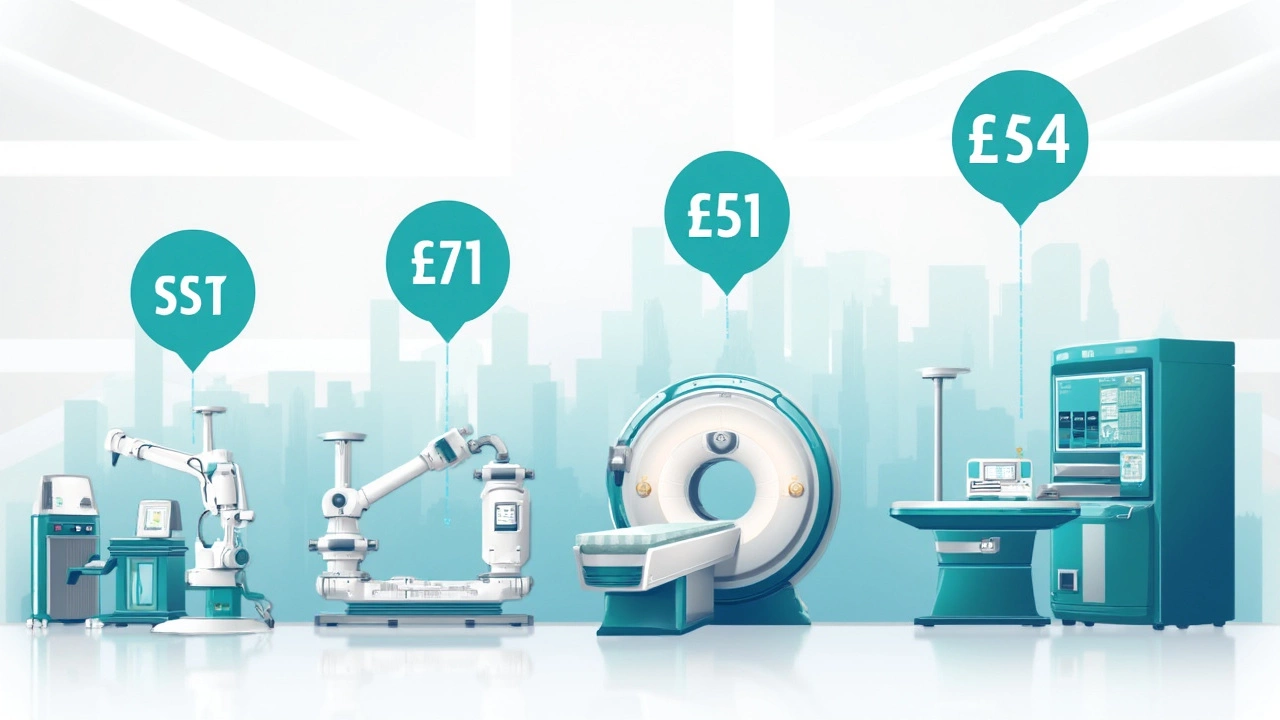
Imagine walking into a hospital and handing over a check big enough to buy a luxury car—or sometimes even a house—just for a single operation. That's the reality for some people facing the world’s most expensive surgeries. Ever wonder what actually tops the charts for private surgery costs? Here’s a look at the wildest prices you’ll find in the world of modern healthcare—and what’s really behind those jaw-dropping numbers.
First up, let's bust a myth. The most expensive surgery isn’t your run-of-the-mill heart bypass, even though that's pricey. It’s actually things like organ transplants (liver, heart, lung), complex neurosurgery, or separating conjoined twins—surgeries that require huge teams, rare skills, loads of advanced tech, and weeks of follow-up care. These aren’t just pop-in, pop-out procedures. Their costs can go way beyond $1 million, especially if you’re in a private hospital in the US, UK, or Switzerland.
- The World’s Priciest Surgeries
- Why Are Some Surgeries So Expensive?
- Real Price Tags: Numbers That’ll Make You Blink
- Tips for Handling High Surgery Costs
The World’s Priciest Surgeries
When it comes to splurging on your health, nothing burns through a wallet faster than most expensive surgery—we’re talking about eye-watering figures that can blow the budget of even a top CEO. So, which procedures actually have five or six zeros on the bill in the world of private surgery cost? Here’s the real scoop:
- Organ Transplants: Heart, liver, and lung transplants top the list. In the US, a heart transplant can run over $1.6 million, and a liver transplant isn’t far behind at almost $900,000 from start to finish.
- Separation of Conjoined Twins: Super rare, but if it happens, the bill can hit $2.5 million or more. The operation needs a huge team, weeks of prep, and months of post-care.
- Intestinal Transplants: Not common, but extremely complicated. Expect costs to hit around $1.2 million for the whole package, including pre- and post-op care.
- Complex Neurosurgeries: Some brain tumor removals, deep brain stimulation, or spine reconstructions can cross $500,000—especially if something unexpected pops up mid-surgery.
| Surgery Type | Estimated Cost (USD) |
|---|---|
| Heart Transplant | $1,664,800 |
| Liver Transplant | $878,400 |
| Intestine Transplant | $1,206,000 |
| Conjoined Twins Separation | $2,500,000+ |
| Brain Tumor Removal | $400,000-$700,000 |
Now, these numbers aren’t just made up. A lot of the time, it’s about the behind-the-scenes work: teams of surgeons, ICU beds for weeks, high-tech drugs, flights for organ delivery, and insurance running in the background. The size of the team is wild—a single transplant can have 30+ specialists on site, each racking up their own fee.
“Modern transplants and major surgical procedures have made life-saving treatments possible, but they do come with enormous costs—in dollars, resources, and time.”
— Dr. Thomas MacGillivray, Cardiac Surgeon, Houston Methodist
No matter what, nobody really expects the scale of these numbers until they see them on paper. If you’re facing surgery in the private sector, you want to know what you’re signing up for. Sometimes, the sticker price even includes things you’d never think about: specialized anesthesia teams, clinical coordinators, and microphones for post-op communication with family. Bottom line: in the world of high cost operations, the numbers add up very fast.
Why Are Some Surgeries So Expensive?
Ever looked at the bill for a private surgery cost and nearly spilled your coffee? Yeah, you’re not alone. These crazy high prices don’t happen by accident. When you see surgeries in the high six or even seven figures, it comes down to a few huge factors.
- Expert Teams: Think about it—around-the-clock care, top surgeons, anesthesiologists, nurses, and even backup specialists. Big procedures like heart or liver transplants can mean dozens of experts on call, all charging by the hour.
- Advanced Tech & Equipment: The latest robotic surgical systems, 3D imaging, and precision tools aren’t cheap. Hospitals upgrade their gear constantly, and that cost ends up on your bill.
- Operating Room Time: The more complicated the surgery, the longer you’re on the table. Some procedures, like a multi-organ transplant, can take over 12 hours, so the run time isn’t cheap.
- Post-Op Care & ICU: Intensive care for days or weeks after surgery bumps the price up fast. That means special rooms, one-on-one nursing, and non-stop medication or support devices.
- Drugs & Supplies: High-end, custom medicines for things like organ rejection cost a fortune, along with disposable surgical packs and blood products.
- Insurance (or Lack Thereof): In the private sector, everything is out-of-pocket unless you have serious insurance. Many folks find they're paying sticker price for every single item and service.
Just to give you an idea, in the US, the average cost for a heart transplant at a private hospital can hit $1.6 million. And that’s not even the highest. Private brain surgery for deep-seated tumors? That often starts at $150,000 and climbs from there.
| Type of Surgery | Estimated Private Cost (USD) |
|---|---|
| Heart Transplant | $1,600,000 |
| Liver Transplant | $850,000 |
| Spinal Surgery (Complex) | $130,000 |
| Neurosurgery (Brain Tumor) | $150,000+ |
| Separation of Conjoined Twins | $2,500,000+ |
The real kicker is geography. For example, most expensive surgery prices in Switzerland and the US are much higher than in India or Thailand, even at top private hospitals. So, it’s not just the operation—it’s the team, tools, aftercare, and where you’re getting it.

Real Price Tags: Numbers That’ll Make You Blink
When we’re talking about most expensive surgery in the private world, it’s not just sticker shock—it’s a reality for some families. The numbers aren’t just big; they’re massive. Here are specific surgeries with real price tags attached, to give you a no-nonsense sense of how steep the climb can get.
First on the jaw-dropping list is a heart transplant. If you go private, you’re probably looking at private surgery cost over $1.5 million in the US. And that doesn’t even factor in the cost of anti-rejection meds and regular checkups afterward. Liver transplants? Those usually pass the $800,000 mark in private US hospitals—sometimes more, depending on complications.
Complex neurosurgeries like separating conjoined twins can hit, and sometimes go above, the $2.5 million line in places like the US or Switzerland. These aren’t surgeries most hospitals can even do, which adds to the big price tag. Here’s a quick look at some actual numbers from private hospitals in a simple table—the kind that really makes you rethink what "expensive" means:
| Surgery Type | Typical Private Cost (USD) | Country |
|---|---|---|
| Heart Transplant | $1,500,000+ | USA |
| Liver Transplant | $800,000+ | USA |
| Lung Transplant | $1,200,000+ | Switzerland |
| Separation of Conjoined Twins | $2,500,000+ | USA/Swiss |
| Spinal Cord Repair (Complex) | $500,000–$1,000,000 | UK/USA |
Even if you look at high-end cosmetic surgeries, the prices can stretch far beyond what insurance will ever cover. Face transplants are another wild card—one in France ran over $1.2 million. These figures don’t just include one doctor. They factor in whole medical teams, use of operating rooms for hours, ICU care, expensive drugs, and, honestly, the price of cutting-edge medicine.
So, if anyone ever tries to brush off the private surgery cost as "not that bad"—send them this way. These are price tags you really don’t want to meet out of the blue, so knowing the real numbers helps you be way more prepared.
Tips for Handling High Surgery Costs
Face it, private surgery cost can be a real shock to the system. If you ever need something as expensive as an organ transplant or a high-end orthopedic procedure, knowing your options matters a lot. So, what can you actually do to protect your wallet and your health?
First, always double-check what’s covered by your health insurance or your employer’s plan. Some big names like Bupa or Cigna might cover parts of a most expensive surgery, but they rarely pay for everything. If you don’t see your procedure on their list, talk to a customer service rep directly. Don’t assume—ask specific questions about exclusions, pre-approvals, and total limits.
- Get Written Estimates: Hospitals are used to people asking for costs upfront. Request line-by-line estimates—not just a lump sum. This helps you spot any surprise fees, from anesthesia to extra nights in a private room.
- Shop Around: Prices for the exact same procedure can jump by thousands, even within the same city. Use tools like Healthcare Bluebook or ask for a second opinion at another private hospital.
- Negotiate: Believe it or not, hospitals will sometimes drop their prices if you ask, especially for “self-pay” patients. It doesn’t hurt to be direct.
- Medical Loans or Payment Plans: For bills over £25,000 or $30,000, many clinics offer payment plans without massive interest rates. Ask upfront what’s available.
- Look Abroad: Medical tourism is a real option. Some top-rated hospitals in places like Turkey, India, or Thailand deliver high-end surgery for a fraction of the price. Just factor in travel, follow-up, and communication needs.
| Country | Heart Transplant (USD) | Hip Replacement (USD) |
|---|---|---|
| USA | $1,500,000 | $40,000 |
| UK (Private) | $1,000,000 | $15,000 |
| India | $120,000 | $7,000 |
Even if you plan ahead, bills can spiral. There are charities and crowd-funding sites that help with crazy-high surgery price tags. But a little research at the start can save a lot of hassle. As Dr. Atul Gawande, respected surgeon and writer, puts it:
"Understanding your options before you need surgery—where, who, how much—can make all the difference when it counts most."
Don’t get caught off guard. Treat it just like any other big financial decision. Ask loads of questions until you feel totally clear. Your health and your finances are both worth it.